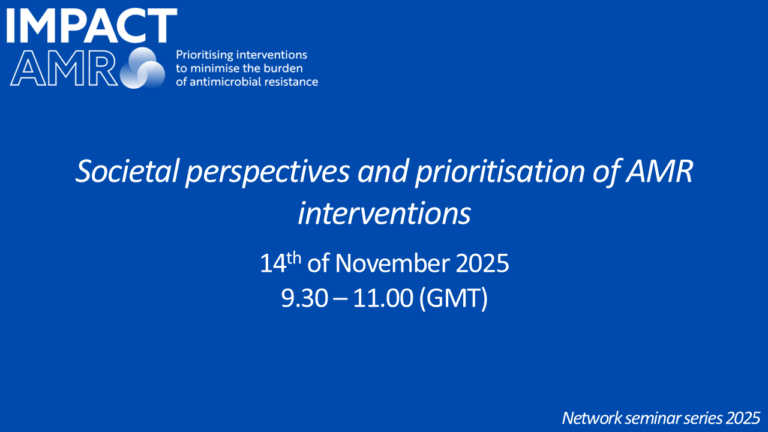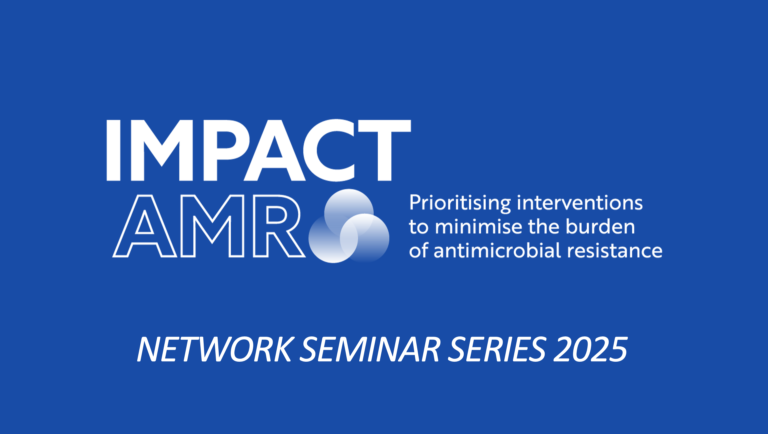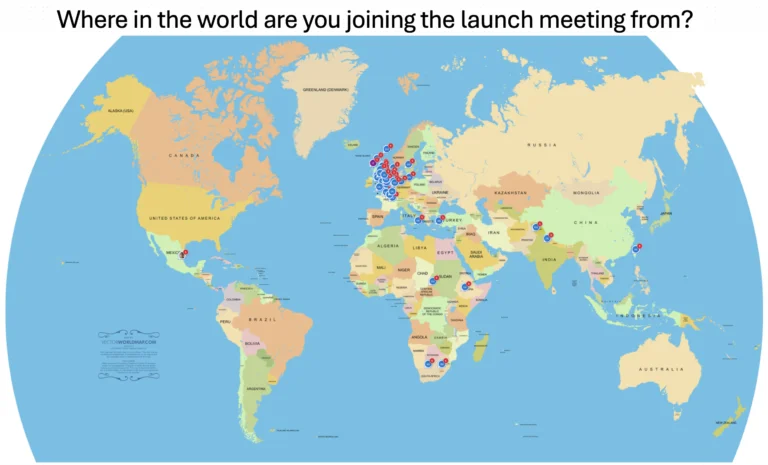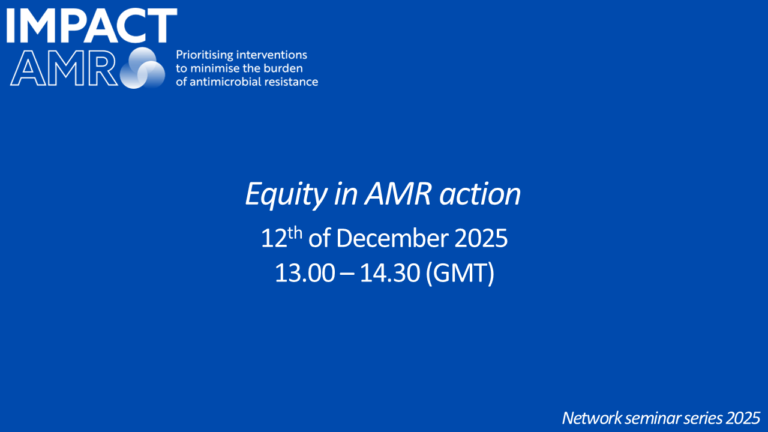Network Seminar Series – October 2025
Value of AMR interventions/Value of antibiotics
The IMPACT AMR Network take a transdisciplinary approach to improving the use of evidence to inform prioritisation of efforts to impact antimicrobial resistance. In Autumn 2025, we will be running a series of thematic seminars, inviting 2-3 speakers at each event to present their work and to engage with the Network’s members to discuss findings, approaches and ways forward.

The second seminar of the series, ‘Value of AMR interventions/value of antibiotics’ will take place on the 17th of October 2025, from 13.00 pm to 14.30 pm (BST), via Zoom, focusing on the work done by experts from the University of Gothenburgh, the University of Edinburgh, and the Research Center for Eco-Environmental Sciences.
Presentations and discussions will include:
- The 3D Value Framework: a straightforward and comprehensive model that focusses directly on what types of valuable outcomes there can be related to having sustainable access to effective antibiotics. This framework addresses recognized flaws in standard pharmacological health economics tools related to antibiotics and AMR, ensuring that broad benefits of managing AMR well are made visible in policy-making. It can be used as a checklist in the context of cost-effectiveness analyses for priority setting and justification of interventions to address AMR across all relevant policy domains – from innovation, over stewardship and environment, to international development support.
- The usage of systems dynamics models of antimicrobial use practices and observations of treatment success or failure, and surveillance-informed prescribing. The models help explore the effects of human behaviour and associated time lags on patterns of antimicrobial susceptibility over time.
- The impact of AMR of changes in air pollution in China, revealing direct or indirect influences of multiple factors on aggregate antibiotic resistance, the pathways of influence, and the estimation of direct and indirect effects on AMR of a range of factors including antibiotic use.
Invited Speakers
Carys Redman-White – The University of Edinburgh (@biocarys.bsky.social on X)
Carys started her career in clinical veterinary medicine after graduating from Cambridge University, having intercalated in zoology with an emphasis on population dynamics and evolution. After three years in clinical practice, she returned to university to study a human-oriented MRes in epidemiology at Newcastle University, further developing her interests in One Health research by undertaking an interdisciplinary PhD at Edinburgh University using system dynamics to model antimicrobial resistance. Through her PhD research, she has investigated AMR from a system-wide perspective, exploring the complex interlinkages between animal health and welfare, environmental health, human health and economics.
Dr. Zhenchao Zhou – The Research Center for Eco-Environmental Sciences, Chinese Academy of Sciences.
Dr. Zhenchao Zhou is an Assistant research fellow at Research Center for Eco-Environmental Sciences, Chinese Academy of Sciences, specializing in interdisciplinary studies spanning environmental science, public health, and antimicrobial resistance (AMR). With a Ph.D. in Environmental Engineering from Zhejiang University and joint training at the University of Cambridge, his research integrates big data, microbial genomics, and AI to address AMR spread via air, water, and soil. He has published 40 papers, including lead-author articles in The Lancet Planetary Health, and leads projects funded National Natural Science Foundation. His work bridges policy and science, contributing to global AMR mitigation strategies.
Prof. Christian Munthe – University of Gothenburg.
Christian Munthe is a founding member and PI in the Centre for Antibiotic Resistance Research in Gothenburg (CARe). A philosopher by training, he conducts interdisciplinary research on ethics, value and policy issues arising in the intersection of health, science and technology, the environment and society. His contributions to bioethics and public health ethics has lately focused increasingly on AMR and sustainable (global) health systems, in collaboration with experts and practitioners from the biomedical, natural, social and technological sciences, healthcare, public health agencies and policy makers.
Key Readings
This paper’s focus was on the impact on AMR of changes in air pollution in China. To do this, the authors projected the premature death and welfare loss attributable to AMR derived from PM2.5 through 2060 using PM2.5 concentrations, To reveal the direct or indirect influences of multiple factors on aggregate antibiotic resistance, authors introduced the SEM to reveal the pathways of influence, estimating direct and indirect effects on AMR of a range of factors including antibiotic use.
The 3D Value Framework for Sustainable Access to Effective Antibiotics
The 3D Value Framework is a straightforward and comprehensive model that focusses directly on what types of valuable outcomes there can be related to having sustainable access to effective antibiotics. This framework addresses recognized flaws in standard pharmacological health economics tools related to antibiotics and AMR, ensuring that broad benefits of managing AMR well are made visible in policy-making. It can be used as a checklist in the context of cost-effectiveness analyses for priority setting and justification of interventions to address AMR across all relevant policy domains – from innovation, over stewardship and environment, to international development support.





